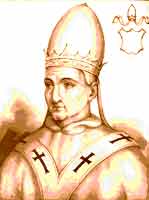 The biographies of preceding popes reveal how gradual was the growth of
the temporal power of the papacy. More and more the rude pressure of
circumstance compelled popes to play the civil ruler. Now by mid-eighth
century, the emperors had left Italy derelict and the popes were forced to
choose between letting the hated Lombards overrun his people or taking
power themselves. Stephen III had to make this decision.
The biographies of preceding popes reveal how gradual was the growth of
the temporal power of the papacy. More and more the rude pressure of
circumstance compelled popes to play the civil ruler. Now by mid-eighth
century, the emperors had left Italy derelict and the popes were forced to
choose between letting the hated Lombards overrun his people or taking
power themselves. Stephen III had to make this decision.
Stephen III was a Roman deacon brought up by the popes after the death of
his father. Since he was formed by men like St. Gregory III and St.
Zachary, it is no surprise that Stephen was devoted to ecclesiastical
tradition, a lover of the poor, and a firm defender of the people.
The East still groaned under the fury of the image-breaking Emperor
Constantine. There was not much Stephen could do but try to recall the
Emperor to his duty. He wrote to Constantine, but it did no good.
The Lombards, under fierce King Aistulf, having overrun the exarchate of
Ravenna, had their eyes on Rome. The Pope, alarmed for the city's safety,
made a peace treaty for which he paid handsomely. But Aistulf cared little
for treaties. The Emperor, his hands full with Bulgarians and Saracens, was
devoting his spare time to smashing images. The best he could do for Italy
was to send an ambassador with an order for the Pope to persuade Aistulf to
give back Ravenna. Stephen did go to Pavia, but when he could get nothing
out of Aistulf, he passed the Alps and made a personal appeal to Pippin.
The Pope solemnly anointed Pippin and his sons Charles and Carloman as
kings. Then Pippin, after Aistulf repulsed three embassies, led a Frankish
army into Italy and brought the tough Lombard to terms. He was to give up
Ravenna and keep peace. But once the Franks disappeared over the Alps,
Aistulf called for an all-out war to overrun Italy. Burning and ravaging,
the Lombards marched on Rome and blockaded the city. Frantically the Pope
multiplied appeals to Pippin, the last being written in the name of St.
Peter himself. After three months the situation looked black, but the
Lombards raised the siege and went north. Pippin was on his way at last.
Another embassy appeared from Constantinople. When they heard about Pippin,
the envoys hurried to meet him and offered him presents if he would restore
the exarchate to the Emperor. Pippin replied that it was only for Blessed
Peter that he had taken arms, and it was to Blessed Peter he would restore
the territory.
Pippin defeated the Lombards again, and this time saw to it that peace was
kept. Stephen III was put in control of the exarchate of Ravenna and now in
756 may be considered the first of the papal monarchs.
Stephen died in 757. Though known to history as the first pope-king, he was
better known to the Roman poor for his great charity.
Excerpted from "Popes
Through the Ages" by Joseph Brusher, S.J.

